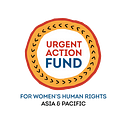How we innovated to resource resilience for activists in Asia and the Pacific
2018 was a year that saw virulent backlash against human rights defenders across Asia and the Pacific, and coincidentally, it was also the first year of operations for us at UAF A&P. The need for strengthening the resilience of movements to bounce back from risks becomes imperative now more than ever. As a small, new player in the philanthropic circle, we explored strategies to innovately make grants, and mobilise different kinds of resources that could grow adaptive capacities for the resilience of the activists and movements we work with.
Grantmaking centred on empathy and a feminist ethics of care. In 2018, we gave a total of 36 rapid response grants amounting to about US Dollars 140,000, across 11 countries in Asia and the Pacific. Since we are cognisant of the inequality in power and resources, we consciously adhere to a feminist ethics of care, and build relationships of empathy with the applicants and grantees. We try to understand the contexts of risk that our applicants face, instead of basing it on our own preconceptions and projections. Our grants aim to encourage good practices of caring, or mature care, that strikes a balance between caring too little and caring too much both for oneself and for others.
Co-creating webs of safety and care grounded on a solidarity economy: We are also collaborating with activists to co-create their webs of safety and care. What we dream of are holistic systems of protection and support for activists rooted in their communities. These systems then transform into safety nets for activists as grants cannot sustainably help them brace against continuous or intensified attacks. We consulted with activists in the Philippines to collectively develop a needs assessment tool that comprehensively looks at the cultural, economic, physical, political, and social dimensions of their needs. We are now poised to work with activists’ organisations and communities across other parts of the region to model these systems. Through these webs of safety and care, we want to strengthen a solidarity economy that builds on growing social capital and communal relationships, anchored in ethics of care and solidarity, instead of competition and individualism. We hope to harness collective power by encouraging communities and beyond to cooperate and collaborate to share resources that can ensure the overall safety and care of activists.
Mobilising resources by activating philanthropy and changing the culture of giving: We realised that we need to expand the definition of resources to encourage giving and sharing that goes beyond funds. We began by convening a regional network of feminists, entrepreneurs and philanthropists currently from six countries who are committed to fostering the culture of ‘giving back’ or ‘paying forward’ for women and human rights. We call it the Women of Courage Asia and the Pacific. We want to tap into other forms of assets that could be mobilised for the protection and support of activists. These could be as diverse as safe houses for relocation or places to go for rest and respite, or even developing potential markets for goods and services produced by activists’ communities to bolster their livelihood and economic sustainability.
We have adopted the culture of giving and sharing internally too. Team members are encouraged to volunteer or donate their time or resources to support activists — one team member invested her month’s salary towards an activist’s medical needs that could not be supported through UAF A&P’s grant. At the year-end party, we practice ‘gifting gratitude’: a letter of gratitude written to a team member randomly chosen, to evoke a sense of being valued and appreciated and part of a caring team.
Developing a system that builds on emergent learning: We are building this fund to be a learning organisation — the more responsive and adaptive it is, the more it can contribute towards building the resiliency of activists and their movements. We began by building a monitoring evaluation, accountability and learning system on a framework centred on emergent learning. We want it to help improve outcomes in adaptive situations by tightly linking data and insights gathered to actionable hypotheses that can be tested on the ground. We are exploring an alternative MEAL framework that contributes to feminist critiques that existing MEAL systems are embedded in patriarchal notions of rationality and measurability. We aim to track not only quantitative outcomes, but also pay close attention to qualitative outcomes that lend itself to stories and narratives that resonate with activists’ communities.
Building a resilient organisation through co-leadership and innovative work arrangements: When we were setting up UAF A&P, we realised that the backlash against human rights could also potentially affect our operations. As preventive measures, we established a virtual office, and diversified countries of registration to brace against increasing restrictive regulations across many countries in the region. We adopted a co-leadership model, that does not default to traditional hierarchies, but practice co-responsibility. We strive to walk our talk, by internalising feminist ethics of care in how we relate with each other; contributing towards solidarity economy by supporting social enterprises, including co-working spaces.
Mary Jane Real and Virisila Buadromo are co-leads of the Urgent Action Fund, Asia and the Pacific
